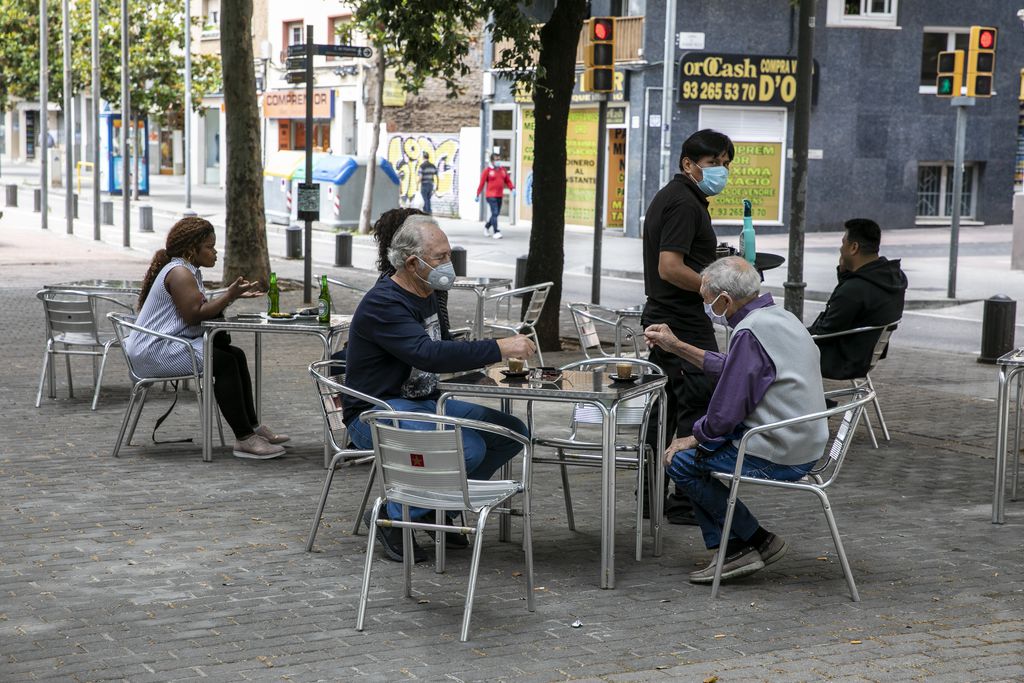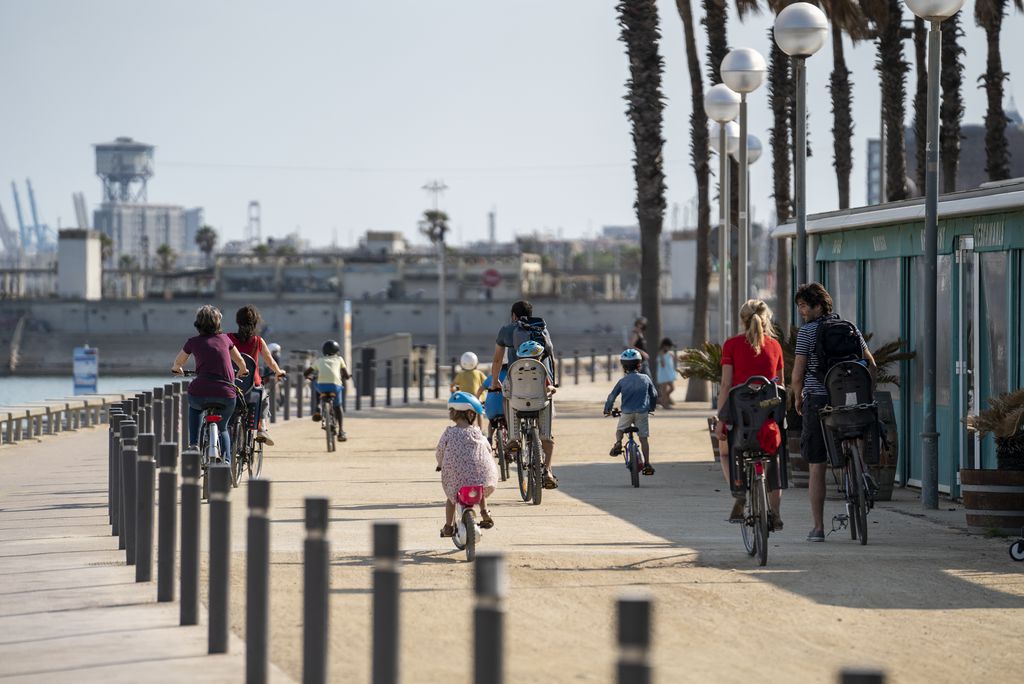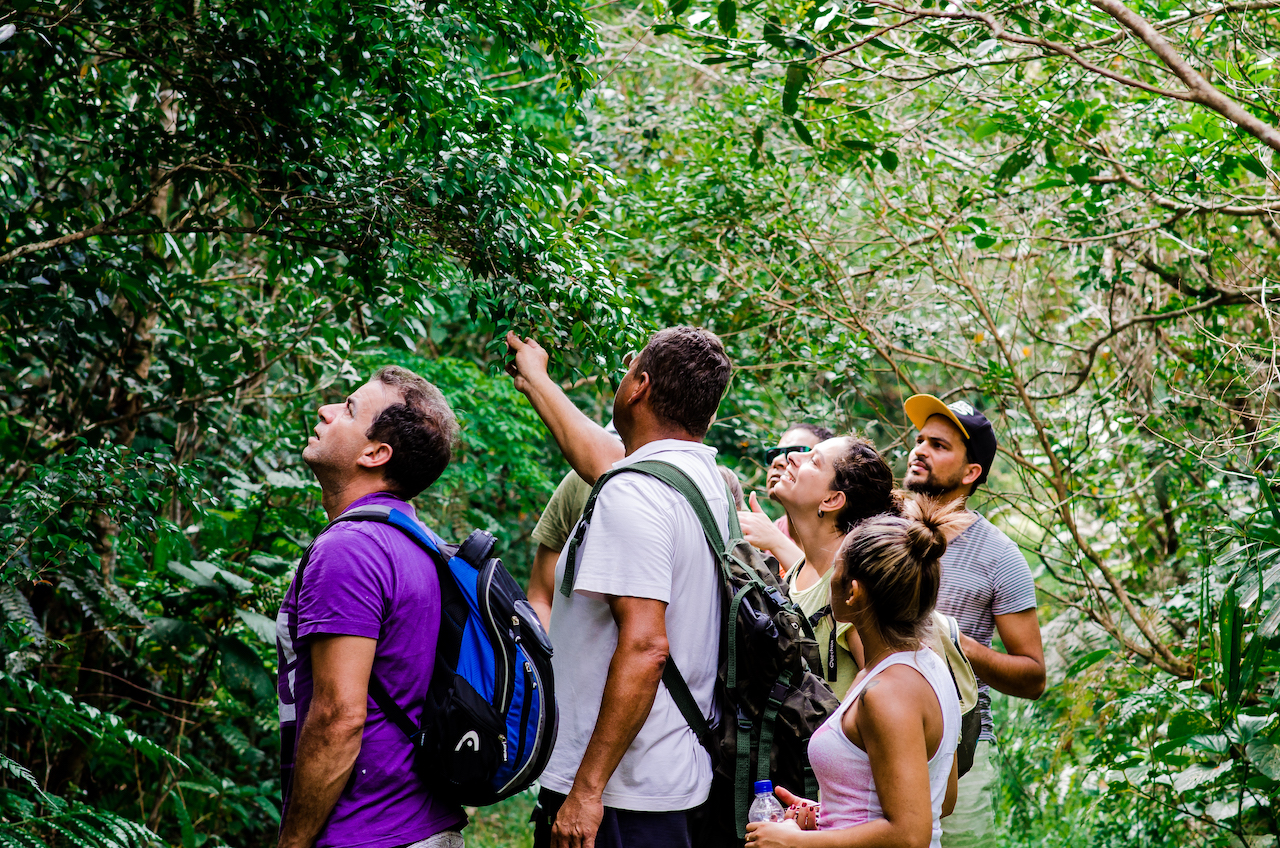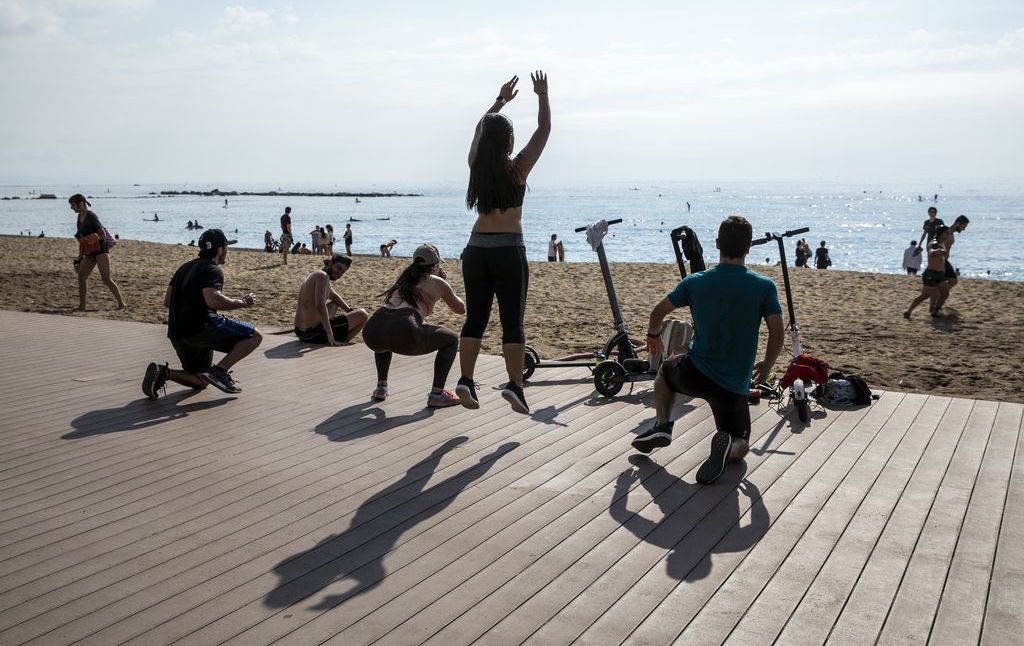08-07-2020
Local tourisms, a plural dispute
Ernest Cañada | Alba SudLocal tourisms are not by themselves alternatives. Rather, they are part of a broader debate on tourism transformation within the framework of an increasingly urgent socio-ecological transition.

Photography by: SESC Bertioga.
The COVID-19 pandemic has exposed the vulnerability of the tourism system, especially in touristic areas that depend on the international market, when the latent threat of a drop in tourist arrivals has happened suddenly and intensely. This crisis has caused a dual reaction. First, as the health alert relaxes and certain activities that were suspended during the state of alarm resume, there is increasing pressure to deal with the situation with quality assurance and security measures, along with reactivating the tourism sector. From this perspective, there is no questioning the prior hegemonic model. Contrarily, the economic emergency has become a reason for demanding that we ease up on some of the regulations and control mechanisms on existing tourist activity, such as the expansion of outdoor bar areas and restaurants in Barcelona until at least 2021. Or, to promote a new twist in the privatization processes in public area management, such as the approval this July in Catalonia of the preliminary bill for the urban economic promotion areas (UEPA), inspired by the Business Improvement Districts (BIDs). Secondly, there is a growing interest in local tourismsinsofar that in the short term they are the only way to compensate for part of the loss in the international market.
We speak of local “tourisms” in the plural because there are numerous types of tourism that can align with local and national markets, and there are various interests at play competing on this stage, which, until now, has been practically disregarded. Based on national markets, dispossession and exploitation dynamics that we have traditionally seen in international markets can also be replicated. However, this is not a future trend, it already exists. We see evidence of this in the rural tourism houses in the Girona region that are practically all reserved for this summer, and which even plan to extend the season. Furthermore, portable swimming pool sales in Spain have soared, with some retail chains suggesting an increase of up to 350%, making it a trend in times of crisis to take vacations at home, known as “staycation”, which we have already seen on other occasions and contexts.
But how can we understand this wager on local tourism? One option is to simply see it as a business possibility that can be carried out during the present moment in which, therefore, certain conditions must be provided in order for it to be possible. Another position, and from where we stand in Alba Sud, is to consider that, despite all the difficulties, it may be an opportunity to rethink tourism on a social level, and press for its transformation and of those tourism policies, within the framework of a broader socio-ecological transition in which tourism should also play a role.
Contradictory scenario
Thinking about tourism transformation from the perspective of a socio-ecological transition means opening up a complex debate with opposing viewpoints, which must absolutely be taken into account. We find ourselves in the midst of a climate emergency in which it is urgent to radically reduce atmospheric pollution, and therefore decrease both long-distance and large-scale international air and sea transport, some of the greatest global contributors to the emission of greenhouse gases. Local tourisms can help relocate tourist activity and reduce climatic pressure. Therefore, public policies that deal with climate emergency should find a potential alliance in them.
At the same time, the economic crisis could be very harsh, much worse than the one that began in 2008, with higher poverty rates and instability, alongside an increase in inequalities. At the end of June 2020 there were 1.2 million jobs losses in Spain’s tourism field, 840,000 still affected by temporary layoffs (ERTEs/Expediente de Regulación Temporal de Empleo) and 350,000 less affiliated with Social Security than in June of the previous year. The ongoing health uncertainty and significant recurrent relapses could accentuate the economic debacle and exacerbate its disastrous effects on existing businesses, seeing the devastation of small and medium-sized companies, a reinforcement of the sector’s global financialization dynamics, as well as the alliance of platform economies’ monopolistic dynamics increasingly present in tourism. However, doing without tourism in the short term isn’t that simple, especially with activities that generate a level of work that could near 2.6 million people employed in Spain’s tourism sector in 2019 (13.4% of total employment) and whose contribution is much higher in certain areas of the country. In the short and medium term, it will be necessary to think of ways of transitioning that take tourism into consideration and have a desire to transform how it functions, how it is applied socially and territorially, and the dynamics of social return. In addition, it will be necessary to consider the many people whom, as employees or self-employed, work in tourism, and who must be part of the social alliances that go along with and sustain this transition process. Local tourisms also seem like an opportunity to generate economic activity without necessarily reproducing the previous model and to establish bridges that can facilitate a process that is, in any case, conflictive.

Edu Bayer, creative commons license.
Dialogue between various participants potentially interested in tourism transformation is not always fluid, nor is there a wide range of alliances that have the capacity to integrate different ways in which to bridge tourism. From a critical or alternative position, we are not used to concrete ways of thinking on how to advance in tourism transformation in a more equitable, sustainable and inclusive sense from the realms of public policy and social action. Vaguely speaking, it is only natural that hegemonic tourism, with all its implications, is the only way possible. Certain positions upheld in the social activism field are found in the simple desire to see this disappear because of the exploitation, exclusion and dispossession created by tourism. When efforts are made to think about how it should work, references are very idealized and not very specific, and above all, their scope is not as far reaching as the existing challenges. In addition, there is not much support or secure structuring among social, neighborhood and environmental activism, which bear the brunt of touristification processes. Labor unions and certain job insecurity or professional organizations, such as tour guides are advocates for the working conditions of those who work in tourism. However, the majority of labor unions do not prioritize alliances with the most critical associative network affected by tourism.
From another perspective, business initiatives (traditional ones or those linked to the Social and Solidarity Economy (SSE)) that make a bid to carry out unconventional tourism initiatives might work well in terms of internal democracy, decent work, and environmental inclusiveness and respect. However, depending on location, it might be contradictory to the needs and rights of the people who live in areas where relieving tourist pressure and diversifying its economy is needed. It can also make an understanding with other social actors difficult. All of this hinders the ability to socially structure a critical discourse, with a serious political willingness and, at the same time, the capacity for transformation. Hypothetically speaking, the wager on local tourisms, in a context of global decline in tourist activity, could favor a space for understanding and collaborative work.
Criteria for influencing local tourisms
Despite the difficulties and contradictions, we need to raise the debate on local tourisms within the framework of a proposal for an extensive socio-ecological transition, not just tourism. This means thinking about economic diversification processes, which shouldn’t be separated from the tourism debate. This also suggests influencing tourism at different levels, not only with alternative proposals, such as those linked to the SSE, and assuming that we will have to act on the existing situation, not the one that we would like, under renewed pressure from the tourist and real estate capital and transportation.
What criteria could help us think about this tourist transition, within the framework of a broader socio-ecological transition, in which local tourisms play a privileged role? We propose acting on five axes from a class and gender perspective in order to influence a revaluation of local tourisms that help a process of tourism transformation from the perspective of socio-ecological transition:
a) Influence conventional tourism production.
Any process of tourist activity transformation must begin by wanting and being able to influence the existing power structure. This means putting limits on international tourism in order to reduce its carbon footprint, both in transport and in the infrastructure of airports and ports of entry that support it, as well as accommodations. This, inevitably, means reversing the dynamics of unbridled growth we’ve seen in recent decades. Additionally, there needs to be a greater will to legislate and regulate against the exploitation and dispossession caused by tourism, with a strict commitment to defend human rights on a large scale.
In times of crisis such as the current one, it is also necessary to strengthen the conditionality of public aid to increase social return due to the presence of activity, through taxation, in employment and working conditions and its effects on the area. We cannot socialize tourist activity losses on a recurring basis, without counterparts of return and social control. However, we will not be able to change central aspects in tourism operation without greater union power within companies and without active policies to defend labor rights.

Martí Petit, creative commons license.
At the same time, the social protection mechanisms being pushed, which are fundamental at this time, must also incorporate those sectors that are increasingly unstable, which are already part of the tourism industry’s structural operation. Thus, labor protection instruments such as temporary layoffs (ERTE), despite their relevance, have left out those in the worst conditions, with temporary and outsourced contracts, thereby aggravating the segmentation and differentiation of the working classes.
Depending on the severity of the crisis, the wave of tourism job losses may lead to dire situations like extreme poverty, especially in towns high in tourism which, such as Lloret de Mar, one of the main beach destinations for tourists in Catalonia, may be faced with a social emergency. In this town, for instance, the demand for food aid has doubled, particularly among people who previously worked in tourism, according to statements from an Alba Sud volunteer. What policies will be put in place for these workers? What will happen to those who have fallen due to the tourist crisis? This situation, given its extension in some areas, will force a reevaluation of social and work-related policies of productive reconversion. Will the thousands of people who have for years dedicated themselves to tourism be destined to depend on public aid?
b) Review and redirect tourism management policies.
It is necessary to have a clear tourism policy proposal that is up to the current challenges. From an emancipatory perspective, this is not a simple facilitation of tourist capital demands trying, more or less timidly, to offset some of the more negative effects, or even to pacify social conflict. We need our own tourism policy, without hang-ups, that defend the interests and rights of the all-encompassing social majorities also in tourism, in its three main dimensions: residents, workers and tourists.
This means blurring the lines between leisure, recreation and tourism in order to develop a shared policy across the board. It also implies putting a wager on a different type of tourism than the simple hedonistic satisfaction of needs created through the market, which can be organized in an emancipatory sense. That is, with the moral purpose of eliminating any form of oppression or domination and, in turn, favoring an expansion of human capacities, in the sense proposed by Denis Goulet in Development Ethics (Iepala, 1999), which contributes to a dignified life in a just society at peace with the planet. We have threads from which we can stretch, such as the social tourism policies that began in the 1930s and 1940s, which are here today with such admirable initiatives as the SESC Sao Paulo, among other Latin American experiences.
Local tourisms, which must be given a structural weight, not only circumstantial when faced with an international arrival crisis at any given moment, can become a place from which to rethink tourism policies. From the tourism policy terrain, attention should be directed to strengthening proposals rooted in that area and especially linked to SSE, reorienting and redesigning social tourism policies, as well as recognizing, valuing and supporting the self-organization processes of popular leisure activities. We have outlined some key points on each of these guidelines below.
c) Strengthen tourism proposals rooted in the area and linked to the SSE.
Local tourisms can act as catalysts for socioeconomic activity in many areas traditionally low in tourism. Territorial dynamics in favor of interrelations of different activities, and which seek ways to increase their diversification and multifunctionality could be promoted. Certain tourist modalities that focus their interest in the area and its productive activities, such as agrotourism, gastronomic tourism, as well as certain forms of rural or camping tourism have a particular ability to generate positive synergies with their environment. Similarly, certain tourism concepts, such as slow tourism, can help in relocating activity.
In the context of low tourism, public aid to local business initiatives rooted in that area should be especially promoted, and doing it in ways that seek to transform hegemonic capitalist relations, like the SSE initiatives would be better. But this commitment to local tourisms must be carried out with policies that control the carbon footprint of different activities present in the area. They should also establish growth limits that allow a rebalancing of different activities. Failure to do so would mean cyclically repeating the problems of overcrowding and over frequentation of that area.
d) Reorient and redesign social tourism policies.
Given the perception that the market is the only way to provide tourism services, social tourism should be expanded and strengthened as a public policy that guarantees access to local tourisms to broad social sectors, and not only to certain age groups as does the main social tourism program in Spain, IMSERSO. As a public policy, we must put the needs of the most disadvantaged people at the center, to the extent that tourism can not only be conceived from a commercial and hedonistic perspective but, following the most progressive agendas on social tourism, can also be at the development of human capacities, health and well-being services, as the Argentine researcher Érica Schenkel has well pointed out. And this implies that it should not be considered a form of indirect subsidy to the tourism industry to mitigate the effects of seasonality, as is currently happening with IMSERSO.

SESC Bertioga.
Social tourism policies should be a central axis of the social policy dispute, occupying a marginal place in public debate focusing only on those who hold contracts for their management, as happened in the last allocation process. At the same time, social tourism is in a dispute because of oppositional ways of understanding it, which means that they can be difficult to recognize from emancipatory perspectives depending on the practices. Deepening a public policy on social tourism will also require clarification on what specific expressions we must defend.
e) Recognize, revalue and support the processes of popular leisure self-organization.
The leisure and outdoor recreation needs of wide-ranging popular sectors cannot be sustained only through the market or the social protection of the State. They are also organized on their own initiative, in a “de-commodified” way and without the help of anyone, such as temporary transfers who "go to the town", and who still maintain links with their places of origin, or by appropriating certain spaces for their daily enjoyment. Parks and squares constitute central elements in permanent dispute between diverse actors. For the vast majority, it is essential that they can access and make these spaces their own, where they can do outdoor activities and socialize.

Edu Bayer, creative commons license.
From the public policy field, the right to all these types of social practices must be defended. In addition, recognizing their legitimacy, providing facilities for the use of these spaces in the face of privatization and exclusionary means, or tourist overcrowding that expels and excludes them, so that they can be used safely and hygienically. Depending on the contexts, it also implies enabling and protecting its use for common benefit over other interests.
Desirable, viable, and feasible alternatives
The post-pandemic scenario is complex and very worrisome. Social risks specifically related to tourism are accumulating: increase in poverty and inequality; greater weight of finance capital and monopolistic dynamics in the tourism industry, and consequently, a loss of local control over its operation and more deregulation and hardening of labor relations; greater elitization of tourist consumption; an increase in distancing, or even the confrontation and breakdown of different social actors because of how to influence the crisis in tourism.
In this context, we need proposals specifically for public policies and social action that bring a prospect of tourism transformation within the framework of a broader socio-ecological transition. In the area of tourism policies, we must be able to formulate desirable, viable and feasible alternative proposals, in the same vein as those articulated by the North American Marxist sociologist Erik Olin Wright in Constructing Real Utopias (Akal, 2014). The problem is capitalism; tourism can be organized in different ways. We shouldn’t confuse the two.
The contexts in which to materialize a political agenda for the transformation of tourism and socio-ecological transition are diverse and will require a concerted effort. The same proposals won’t work everywhere because life is different. In any case, an effort of particular understanding, social convergence, and creating a list of priorities so as not to leave anyone behind is needed.
Local tourisms are not, in short, an alternative; they are fundamentally a wager being argued in a broader debate on tourism transformation in the framework of an urgent socio-ecological transition -- an opportunity that should not be missed.
